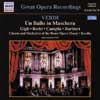Verdi (Un) ballo in maschera
A complete Ballo with Gigli and Caniglia somewhat outclassed by Bonci and ArangiLombardi’s extracted arias
View record and artist detailsRecord and Artist Details
Composer or Director: Giuseppe Verdi
Genre:
Opera
Label: Historical
Magazine Review Date: 5/2002
Media Format: CD or Download
Media Runtime: 153
Mastering:
Mono
ADD
Catalogue Number: 8 110178/9

Tracks:
| Composition | Artist Credit |
|---|---|
| (Un) ballo in maschera, '(A) masked ball' |
Giuseppe Verdi, Composer
Beniamino Gigli, Riccardo, Tenor Blando Giusti, Judge, Tenor Elda Ribetti, Oscar, Soprano Fedora Barbieri, Ulrica, Contralto (Female alto) Gino Bechi, Renato, Baritone Giuseppe Verdi, Composer Maria Caniglia, Amelia, Soprano Nicola Niccolini, Silvano, Baritone Rome Opera Chorus Rome Opera Orchestra Tancredi Pasero, Sam, Bass Tullio Serafin, Conductor Ugo Novelli, Tom, Bass |
Author:
Like several of its predecessors‚ this set comprises a complete opera and a number of excerpts‚ also from 78rpm originals‚ added as an appendix to the second disc. In this instance the earlier recordings almost constitute commentary on the complete performance.
Alessandro Bonci‚ at the age of 56 and near the end of his distinguished career‚ has an elegance of line and style that point to what was lacking in Gigli’s account‚ which‚ generous in voice and warm in feeling‚ yet wants nobility of manner‚ both in vocal usage and expression. Giannina ArangiLombardi in Amelia’s arias gives a masterclass to Caniglia in practically every aspect of her work; and though sorry to find myself in disagreement with Paul Campion‚ who uses his allotted space as notewriter so adroitly‚ I have to say that when he describes ArangiLombardi as ‘less able to suffuse [her role] with the required passion’ I find precisely the opposite (suffusion‚ a relatively subtle process‚ being exactly what she does achieve).
Riccardo Stracciari’s singing of ‘Eri tu’ in 1927 has not‚ I think‚ much to teach Gino Bechi‚ whose own performance in the set is its high point‚ but in the first aria‚ ‘Alla vita’‚ he gives a fine demonstration of the arts of shaping and shading‚ the use of portamento and rubato‚ the absence of which have made Bechi’s performance a nonevent until a magnificent but shamelessly prolonged high G defiantly seizes one’s attention.
The earlier singers have their faults too‚ and it’s doubtful whether‚ however far back one might delve into the socalled ‘golden age’ on records‚ an Ulrica could be found who would match the young Barbieri. Also a strong point in favour of this new transfer by Ward Marston is that it improves on the EMI version (4/01) by successfully smoothing over some awkward sidejoins and inconsistencies of balance between voices and orchestra. And‚ whatever Gigli is not‚ he is still Gigli‚ to whom‚ in 1918‚ the jury headed by Bonci himself awarded first prize as ‘the tenor’ of his generation.
Discover the world's largest classical music catalogue with Presto Music.

Gramophone Digital Club
- Digital Edition
- Digital Archive
- Reviews Database
- Full website access
From £8.75 / month
Subscribe
Gramophone Full Club
- Print Edition
- Digital Edition
- Digital Archive
- Reviews Database
- Full website access
From £11.00 / month
Subscribe
If you are a library, university or other organisation that would be interested in an institutional subscription to Gramophone please click here for further information.




